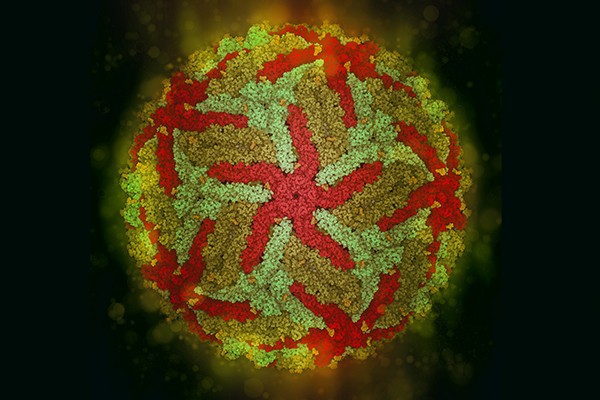Attacking Cancer with Immunotherapies
Jefferson scientists and clinicians continue to advance new approaches for cancer therapies. Two potential immune-prompting treatments—one for solid tumors and advanced non-small-cell lung carcinoma, and a second for recurrent gastrointestinal tumors—entered clinical trials in fall 2020.
The first drug is based on multi-functional immuno-recruitment proteins developed by Mark Tykocinski, MD, President, Thomas Jefferson University and Anthony F. and Gertrude M. DePalma Dean of Sidney Kimmel Medical College. Created through the fusion of proteins with carefully selected characteristics, the treatment is designed to have a two-part action: first, disabling cancer cells’ ability to camouflage themselves from the immune system; then, stimulating proliferation of T-cells that attack the tumor cells. The current Phase I/II multi-center clinical trial is evaluating the drug alone and in combination therapy with an existing PD-L1-blocking checkpoint inhibitor.
“It is exciting to see this novel platform moving forward into clinical development for the benefit of cancer patients," Dr. Tykocinski says. “Its potential as both a stand-alone therapeutic and one used in combination with existing drugs is enormous.”
The second drug undergoing trials targets a molecule found throughout the small intestine and colon—guanylyl cyclase C (GUCY2C)—that continues to be expressed when the cells become malignant. The drug acts like a vaccine, inducing the patient’s immune system to seek out and kill colon cancer cells expressing GUCY2C. “However, this is not designed to prevent initial development of the cancer,” explains Adam Snook, PhD, assistant professor of pharmacology and experimental therapeutics. “It is designed to prevent cancer from returning, and is being given after a patient has surgery and other standard therapies, such as chemotherapy.” Dr. Snook led the basic and translational research with Scott Waldman, MD, PhD, the Samuel M.V. Hamilton Professor of Medicine and chair of pharmacology and experimental therapeutics. Babar Bashir, MD, assistant professor of medical oncology, leads the clinical trial operation.
As a vector for prompting the immune system, the vaccine uses a modified version of the common adenovirus that incorporates the spike protein of a rare adenovirus serotype. Having proven the vaccine’s safety and efficacy in mouse colon cancer models, the current Phase IIa clinical trial’s initial aim is to demonstrate that the drug is capable of safely inducing significant immune responses in colon cancer patients. In addition, because GUCY2C has recently been discovered in gastric, esophageal and pancreatic cancers—which also have high recurrence rates—the trial is enrolling patients with those malignancies. “Our long-term objective is to add this vaccine strategy to the toolkit of therapies for a range of gastrointestinal cancers that together account for about 20 percent of all cancer deaths,” Dr. Snook says.


